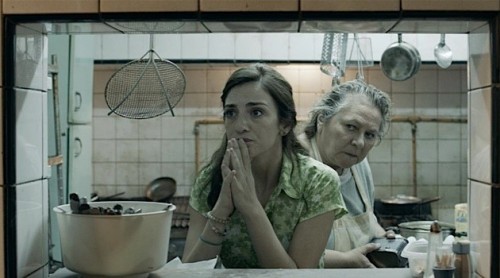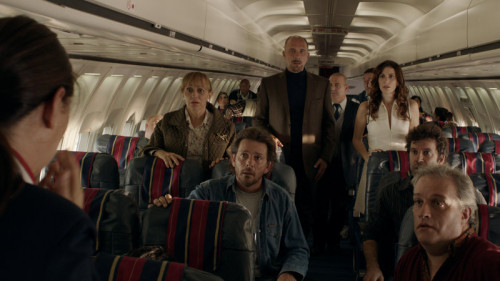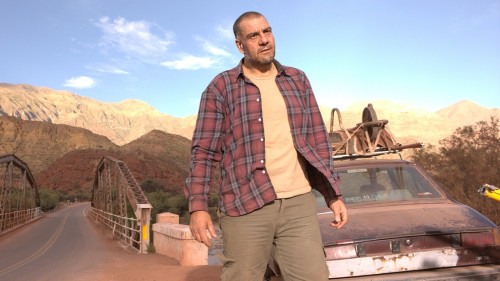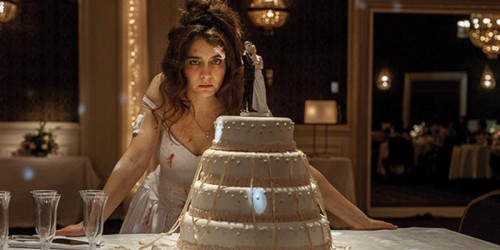 If there’s one universal truth that binds humanity together, it’s this: everyone has had a moment where they want to absolutely destroy whomever has wronged them. Whether over a stolen parking space, obnoxious behavior in public, or a long-standing grudge, every human being on Earth has been subject to a strong desire for revenge at some point. It’s in our nature – or so the Argentinian nominee for Best Foreign Film at last year’s Oscars would have us believe. Wild Tales, currently playing in an art house near you, makes the case that revenge is an animalistic urge, to which we are all subject. The black comedy proceeds to argue its case in the form of six short stories segued together by theme in this anthology film.
If there’s one universal truth that binds humanity together, it’s this: everyone has had a moment where they want to absolutely destroy whomever has wronged them. Whether over a stolen parking space, obnoxious behavior in public, or a long-standing grudge, every human being on Earth has been subject to a strong desire for revenge at some point. It’s in our nature – or so the Argentinian nominee for Best Foreign Film at last year’s Oscars would have us believe. Wild Tales, currently playing in an art house near you, makes the case that revenge is an animalistic urge, to which we are all subject. The black comedy proceeds to argue its case in the form of six short stories segued together by theme in this anthology film.
Film as Short Story
 Why six separate tales? Why not a cohesive narrative? Wild Tales succeeds in part because the six stories that it tells are so wildly divergent yet thematically cohesive. Were the film to only focus on one story, it would lose much of the nuance of the theme it strives to convey. How else could a dramatic story about a waitress seeking revenge on the mobster who wronged her family shift into a slapstick farce about road rage? With only Argentina serving as the backdrop, the film jumps across all social classes, showing how universal our desires for revenge truly are.
Why six separate tales? Why not a cohesive narrative? Wild Tales succeeds in part because the six stories that it tells are so wildly divergent yet thematically cohesive. Were the film to only focus on one story, it would lose much of the nuance of the theme it strives to convey. How else could a dramatic story about a waitress seeking revenge on the mobster who wronged her family shift into a slapstick farce about road rage? With only Argentina serving as the backdrop, the film jumps across all social classes, showing how universal our desires for revenge truly are.
By playing each segment as a short, the film also is better able to introduce an element of comedy where before there would be only pot-boiler drama. Take the opening segment, “Pazdernak”. In it, a group of strangers on a plane realize that they have all been drawn in by a shared figure from their past seeking to enact his revenge. Were this an intricate film, it would be fine – critics would regard it as “clever”. Here, the viewer is treated to a swift crescendo of dark humor that climaxes with a well-placed slow burn of a visual joke as the wronged titular figure drives his point home. By wrapping up the short in such fashion, audiences know they are free to laugh as the film leaps on to several different studies of revenge.
Revenge Is In Our Nature
Wild Tales opens with the aforementioned story of a disturbed man who is enacting his cruelest revenge fantasy. The credits follow directly after, taking the time to showcase a parade of stills of wild animals. The filmmakers are drawing a direct correlation between the actions of wild beasts and of the wild denizens of the film’s stories. The film has several recurring motifs – the ruling class should be viewed with mistrust, privilege is to be disdained, and the universe holds in its heart an unblinking sense of impartial justice – but the image of wild savagery sticks to nearly every character in the film.
 Consider the aforementioned ‘road rage’ scene. The basic story tells of two men driving on a back country road – one a well off upper-middle class hotshot in a new car, the other a back country redneck in a broken down automobile. One forgettable incident on the road leads to an afternoon of destruction, and while neither is solely to blame for the escalation that follows, neither is innocent. Theirs is a mutually assured destruction, one brought out by an intense desire to one-up and bring about absolute shame to each other. Neither can let go of their desire to obliterate their enemy, and neither can claim victory – there’s no time and room for error. At the segment’s climax, a casual observer theorizes that it might have been a ‘crime of passion’. That’s not so far from the truth – a passionate desire for victory is what brings about the ultimate tragic defeat for both men.
Consider the aforementioned ‘road rage’ scene. The basic story tells of two men driving on a back country road – one a well off upper-middle class hotshot in a new car, the other a back country redneck in a broken down automobile. One forgettable incident on the road leads to an afternoon of destruction, and while neither is solely to blame for the escalation that follows, neither is innocent. Theirs is a mutually assured destruction, one brought out by an intense desire to one-up and bring about absolute shame to each other. Neither can let go of their desire to obliterate their enemy, and neither can claim victory – there’s no time and room for error. At the segment’s climax, a casual observer theorizes that it might have been a ‘crime of passion’. That’s not so far from the truth – a passionate desire for victory is what brings about the ultimate tragic defeat for both men.
Oh, and it’s absolutely fucking hilarious.
Revenge Is Destructive
 Nearly every segment ends in some type of tragedy, whether through death, imprisonment, or self-immolation. The films seems to be arguing that while revenge is a natural element of the human experience, it’s also one that cycles endlessly, a cycle that whirlwinds its way to inevitable self-destruction. A restaurant cook mentions that she’s done time before and states that she would do it again, that it was necessary. A demolitions expert is slowly destroyed by a bureaucratic system which brings out and embellishes his own self-destructive tendencies. An accident in the night leads to the financial and emotional ruin of a wealthy family. A wedding reception turns into an orgy (literally, in one scene) of violence, a cacophony of chaos.
Nearly every segment ends in some type of tragedy, whether through death, imprisonment, or self-immolation. The films seems to be arguing that while revenge is a natural element of the human experience, it’s also one that cycles endlessly, a cycle that whirlwinds its way to inevitable self-destruction. A restaurant cook mentions that she’s done time before and states that she would do it again, that it was necessary. A demolitions expert is slowly destroyed by a bureaucratic system which brings out and embellishes his own self-destructive tendencies. An accident in the night leads to the financial and emotional ruin of a wealthy family. A wedding reception turns into an orgy (literally, in one scene) of violence, a cacophony of chaos.
And yet, the film suggests that a break from the cycle of revenge is possible. In the film’s last scene, director Damián Szifron seemingly posits that salvation lies not within walking away from our worst tendencies, but rather in embracing them. What follows only seems like a trite resolution to the animal-like craving for vengeance on the surface – in actuality, what is being conveyed is that a desire for violent revenge in inherent in all of us. Only acknowledging and giving into our worst tendencies can we accept that deep down, we are all animals. Once we’ve done this, and only once we’ve done this, it becomes possible to not just rise above the whirlwind…but to thrive in it.
Which, when you come down to the basics, is a wild tale indeed.
…
Wild Tales is currently playing at Chicago’s Landmark Century Centre Cinemas.
Images courtesy of imdb.com





